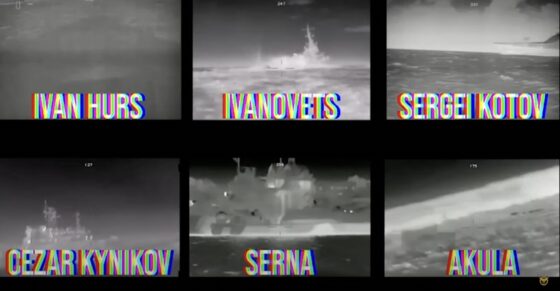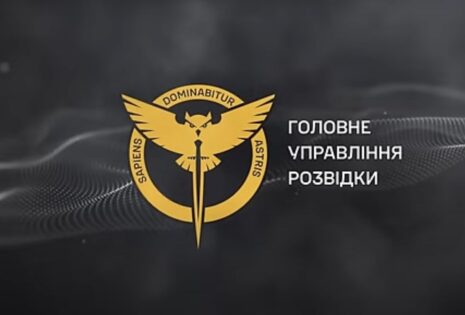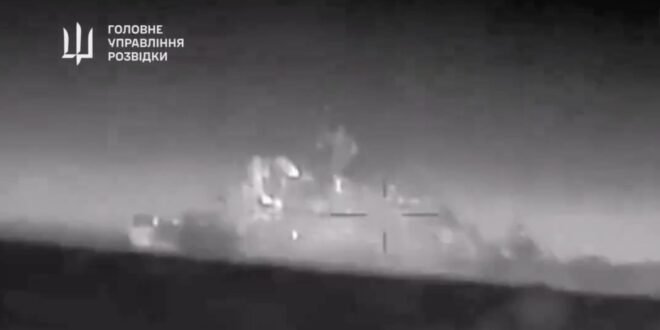The group is both secretive and public, revealing just enough of its activities to evoke a vibe.
by Susan Katz Keating
Ukraine’s shadowy “Group 13” fighters keep sending Russian warships to watery graves, while the Defense Ministry promises “more to come” in a new video that shows recent hits against the enemy. Aside from having highly effective direct targeting skills, what is this prolific unit?
“Group 13 is hunters for Russian ships,” according to the Ministry of Defense of Ukraine. The unit consists of maritime drone operators, and claims to have destroyed a multitude of Russian watercraft, the latest being the Cezar Kynikov on Feb. 14 in the Black Sea.

Screenshot from Defence Intelligence of Ukraine video.
The group is both secretive and public, revealing just enough of its activities to evoke a vibe. Its media arm seems to take at least some inspiration from U.S. Army Psyops, using music and imagery to impart mystique.
In the video posted to YouTube and on its website, the Defense Intelligence ministry claims that the unit either sank or disabled six vessels: the Ivan Hurs, the Ivanovets missile ship, the Sergei Kotov patrol ship, the Cezar Kynikov, the Serna, and the Akula. The unit also claims to have hit the Admiral Makarov frigate.
The unit lineage stems from the 1991 collapse of the USSR. Group 13 belongs to the Ukrainian Defense Ministry’s Main Intelligence Directorate, which itself descends from Soviet formations.
“Officers who initially served in the intelligence systems of Soviet formations stationed in the Ukrainian territory, and those who returned to Ukraine from various parts of the former USSR became the organizational core,” according to the Defense Ministry’s Main Intelligence Directorate.
These include assets from a number of districts, and a portion of the Black Sea Fleet.
The latter element plays into Group 13’s success.
“We know how Black Sea Fleet operates,” one Ukrainian military officer said, speaking to Soldier of Fortune on a secure messaging platform. “We know their strength and of course their weakness.”
Soldiers who serve in Group 13 did not necessarily serve in the Soviet Black Sea Fleet, the officer said.
“This cannot be assumed and is not correct,” he said. “It’s more a situation where understanding was passed down.”
The understanding includes knowledge of operational procedures and attitudes, he said, along with a sense of navy culture.

The date of the attack on the Cezar Kynikov, for example, was chosen with deliberation, he said.
The ship went down on the anniversary of when its namesake, Tsezar Lvovich Kynikov, was killed during World War II. The original Kynikov, a Hero of the Soviet Union, served in the Soviet naval infantry. He was killed in combat on 14 February 1943.
The symbolism was not lost on observers. One Russian language think tank, Rybar, noted the date along with another anniversary strike elsewhere, inside Russia. There, Ukrainian forces on Feb. 15 used old Serbian missiles to hit Belgorod, on Serbia Statehood Day.
“Such coincidences simply do not occur naturally,” Rybar noted. “Usually, the British, who are known for their love of symbolism and everything related to it, commit such acts.”
The Ukrainian armed forces use more customary methods also when hunting for Russian ships. The Cezar Kynikov‘s sister ship, the Novocherkassk, was destroyed by Ukrainian cruise missiles in December 2023. But the Main Intelligence Directorate says it has found particular success using drones against “more than more than half a dozen enemy warships,” including against the Cezar Kynikov.
The directorate posted video of that attack.
“The successful mission was carried out by special officers of Group 13,” the directorate wrote on its website.
More strikes are forthcoming, Ukraine says.
“The boys say that for the Russian Fleet there is only a beginning, and even more technologies may come,” the directorate wrote.
The Defence Ministry video used direct English in a closing pledge: “More to come.”

Moscow has not confirmed the latest strike, and it is unclear whether its military has announced updates. The Russian Ministry of Defense has blocked Soldier of Fortune from accessing its website, and could not be reached for comment.
The Kremlin did not respond to an inquiry from Soldier of Fortune. Russian President Vladimir Putin did not respond to a request for comment posed to him through a secure messaging channel.
Susan Katz Keating is the publisher and editor in chief of Soldier of Fortune.
 Soldier of Fortune Magazine The Journal of Professional Adventurers
Soldier of Fortune Magazine The Journal of Professional Adventurers






